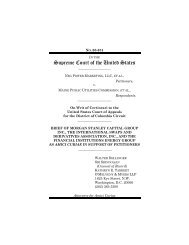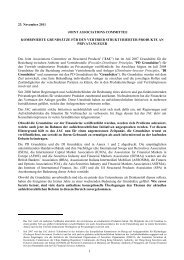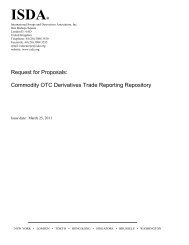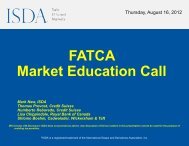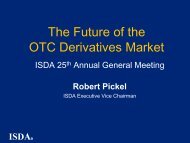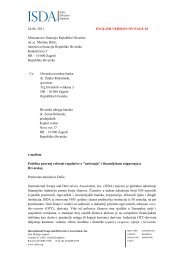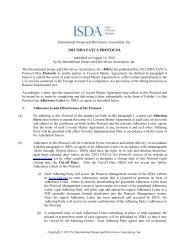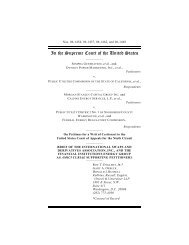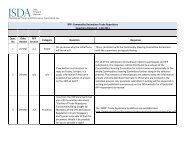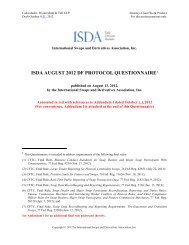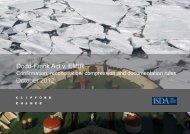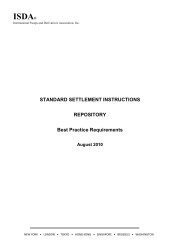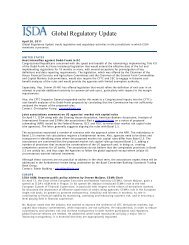ISDA Asia Pacific Monthly Update-Mar13.pdf
ISDA Asia Pacific Monthly Update-Mar13.pdf
ISDA Asia Pacific Monthly Update-Mar13.pdf
Create successful ePaper yourself
Turn your PDF publications into a flip-book with our unique Google optimized e-Paper software.
APAC <strong>Monthly</strong> <strong>Update</strong>March 2013APAC <strong>Monthly</strong> <strong>Update</strong> summarizes important regulatory developments, meetings, committee activities andconferences in the region.Regulatory ActivitiesChina:On March 5, <strong>ISDA</strong> met with the China Banking Regulatory Commission (CBRC) to discuss issuesrelating to the OTC derivatives regulatory reforms in the EU and US and the impact on financialinstitutions operating in China, such as trade reporting issues and BCBS/IOSCO proposal regardingmargin for uncleared transactions.On March 5 and March 6, <strong>ISDA</strong> conducted two meetings with the People’s Bank of China to discussissues relating to offshore RMB markets and central clearing of OTC derivatives.Hong Kong:On March 28, <strong>ISDA</strong> met with Ashley Alder, CEO of Securities and Futures Commission ofHong Kong to discuss issues on ESMA recognition of third country CCPs.India:On March 11, <strong>ISDA</strong> met with:- the Department of Banking Operations and Department of the Reserve Bank of India to discussthe notification issued by The Clearing Corporation of India Ltd. (CCIL) dated 28 February 2013on changes to the regulations of CCIL’s Forex Forward Guaranteed Settlement Segment, greaterconsistency in the application of close-out netting directives, third country recognition issuesunder the Dodd-Frank Act and EMIR, determination as to whether a CCP is a Qualifying CCP,third country recognition issues under the Dodd-Frank Act and EMIR and ongoing developmentsin the global OTC derivatives market.- The Clearing Corporation of India Ltd. (CCIL) to discuss the notification issued by CCIL dated28 February 2013 on changes to the regulations of CCIL’s Forex Forward Guaranteed SettlementSegment, determination as to whether a CCP is a Qualifying CCP, greater consistency in theapplication of close-out netting directives, trade reporting and clearing issues as well as ongoingdevelopments in the Indian and global OTC derivatives market.On March 12, <strong>ISDA</strong> conducted a presentation to the Legal Department of the Reserve Bank of India onthe following topics: an introduction to <strong>ISDA</strong> and its activities, OTC derivatives, an overview of <strong>ISDA</strong>documentation and issues of close-out netting, collateral and regulatory capital. <strong>ISDA</strong> also presented anoverview of G20 regulatory reforms, including the Dodd-Frank Act, EMIR, margin requirements for1
uncleared OTC derivatives as well as issues of concern to India in relation to these ongoing globaldevelopments.On March 12, <strong>ISDA</strong> met with:- the Internal Debt Management Department of the Reserve Bank of India (RBI) to discuss RBI’scircular dated January 28 on the standardization of interest rate swap contracts and ongoingrelated efforts, margin requirements for uncleared OTC derivatives, the Indian CDS market aswell as other developments in the Indian market, the notification issued by The ClearingCorporation of India Ltd. (CCIL) dated 28 February 2013 on changes to the regulations ofCCIL’s Forex Forward Guaranteed Settlement Segment and ongoing developments in the Indianand global OTC derivatives market.- the Foreign Exchange Department of the Reserve Bank of India (RBI) to discuss the notificationissued by The Clearing Corporation of India Ltd. (CCIL) dated 28 February 2013 on changes tothe regulations of CCIL’s Forex Forward Guaranteed Settlement Segment, third countryrecognition issues under the Dodd-Frank Act and EMIR and ongoing developments in the Indianand global OTC derivatives market.Committee/Working Group ActivitiesNorth <strong>Asia</strong> L&ROn March 26, <strong>ISDA</strong> held its monthly Legal &Regulatory meeting in Hong Kong. Topics discussed inrespect of North <strong>Asia</strong> included the expanded RQFIIs regime announced by CSRC, HKMA’s consultationregarding interim reporting requirements for OTC derivative transactions, the latest relaxation of SFCpolicy on RMB retail structured products and the Revision Bill of the FSCMA introducing mandatorycentral clearing in Korea as well as the draft Korean law governed CSA. <strong>ISDA</strong> also briefed members onthe latest regulatory developments in Southeastern <strong>Asia</strong> including the Consultation Paper 201 onderivatives trades repositories released by the ASIC on March 15, <strong>ISDA</strong>’s submission addressed to theRBI, MOF and CCIL on the CCIL Forex Forward Guaranteed Segment (the Segment), the RBI circulardated March 13 on Reporting Platform for OTC Foreign Exchange and Interest Rate Derivatives and theamendments published by CCIL relating to its regulations governing the Segment.The meeting also provided an update on current <strong>ISDA</strong> efforts and projects including the proposedchanges to the 2003 Credit Derivatives Definitions, the publication on March 25 of the <strong>ISDA</strong> LIBORDiscontinuations Guidance Note and associated Amendment Letter, the publication on March 22 of the<strong>ISDA</strong> March 2013 Dodd-Frank Protocol , the proposed <strong>ISDA</strong> Reporting Protocol Working Group, theproposed <strong>ISDA</strong> working group on conflicts between mandatory trade reporting requirements and nationallaws, the <strong>ISDA</strong> response on March 18 to BCBC and IOSCO on the Second Consultative Document“Margin Requirements for Non-Centrally Cleared Derivatives”, the publication on March 8 of the EMIRNon-Financial Counterparty Representation Protocol and Timely Confirmation Agreement and theupcoming <strong>ISDA</strong> FLRC hosted “Arbitration in Derivatives” meeting in Singapore. Members alsodiscussed the impact of Article 25(1) of EMIR on <strong>Asia</strong>n CCPs and the practical guide released by ESMAon March 12 on recognition of third-country CCPs.South <strong>Asia</strong> L&ROn March 26, <strong>ISDA</strong> held its L&R Members’ meeting in Singapore. Topics discussed included the use ofJIBOR for onshore IRS trades, Consultation Paper 201 on derivatives trades repositories released by theAustralian Securities & Investments Commission on March 15, an update on <strong>ISDA</strong>’s trip to Mumbai onMarch 11 and 12, the Indian Budget proposal to amend the Bombay Stamp Act, <strong>ISDA</strong>’s submission datedMarch 20 addressed to the Reserve Bank of India (RBI), the Ministry of Finance (MOF) and The Clearing2
Corporation of India Ltd (CCIL) on the CCIL Forex Forward Guaranteed Segment (the Segment), theRBI circular dated March 13 on Reporting Platform for OTC Foreign Exchange and Interest RateDerivatives and the amendments published by CCIL relating to its regulations governing the Segment.Also discussed were the assessment dated March 20 concluded by the Basel Committee on theimplementation of Basel III capital regulations in Singapore, the Revised Notice 637 dated February 8issued by the Monetary Authority of Singapore (MAS) on Risk Based Capital Adequacy Requirementsfor Banks incorporated in Singapore, the Interim Measures issued by the CSRC on March 6 onInvestments of Renminbi Qualified Overseas Investors in Domestic Securities, the consultation by theHKMA on interim requirements for OTC derivative transactions, the latest relaxation of SFC policy onRMB retail structures, HKMA’s consultation paper released on March 4 relating to draft banking (Capital)(Amendment) Rules 2013, the Revision Bill released on March 5 by the Korean National Assembly onFinancial Investment Services and Capital Markets Act and the draft Korean law governed Credit SupportAnnex.The meeting also provided an update on current <strong>ISDA</strong> efforts and projects including the <strong>Asia</strong>n Membersupdate call hosted by <strong>ISDA</strong> and Allen& Overy on proposed changes to the 2003 Credit DerivativesDefinitions, the publication on March 25 of the <strong>ISDA</strong> LIBOR Discontinuations Guidance Note andassociated Amendment Letter, the publication on March 22 of the <strong>ISDA</strong> March 2013 Dodd-FrankProtocol , the Proposed <strong>ISDA</strong> Reporting Protocol Working Group, the Proposed <strong>ISDA</strong> Working Groupon Conflicts between mandatory Trade Reporting Requirements and National Laws, the <strong>ISDA</strong> responseon March 18 to BCBS and IOSCO on the Second Consultative Document “Margin Requirements forNon-Centrally Cleared Derivatives”, the publication on March 8 of the EMIR Non-FinancialCounterparty Representation Protocol and Timely Confirmation Agreement and the upcoming <strong>ISDA</strong>FLRC hosted “Arbitration in Derivatives” meeting in Singapore.The meeting also discussed the First FAQs released by ESMA on March 20 on EMIR implementation,the coming into force on March 15 of six EMIR RTS, the CICI Guidance dated March 13 on registrationand certification as well as the practical guide released by ESMA on March 12 on recognition of thirdcountryCCPs.Operations/Market InfrastructureOn March 13, <strong>ISDA</strong> held its APAC Interest Rates Derivatives Operations Working Group meeting tobrief members on the latest regional developments in rates. The group also discussed theaddition/amendment of floating rate options/matrices, the issues on electronically confirming certainproducts, novation practice and the upcoming changes in certain rate fixings.On March 14, <strong>ISDA</strong> held its APAC Equity Derivatives Operations Working Group meeting to update thelatest confirmation template development for <strong>Asia</strong>n products. The group also discussed the AEJ referenceprice source matrix, the eligibility in confirming certain products via an electronic confirmation platformand the confirmation practice for products involving CNY/USD.On March 12, 14, 18, 25 and 26, <strong>ISDA</strong> held its APAC Trade Reporting Sub Group meetings to discussthe Hong Kong trade reporting matters.3
Member ActivitiesBeijing Members Meeting:On March 4, <strong>ISDA</strong> held its quarterly China members meeting in Beijing. At the meeting,members discussed the new FX regulations applicable to Qualified Foreign InstitutionalInvestors (QFIIs), <strong>ISDA</strong>’s letter to <strong>Asia</strong>n CCPs and latest equity documentation projects. <strong>ISDA</strong>also updated members on the progress of the US and EU regulatory reforms in respect of OTCderivatives and the impact of the reforms on financial institutions operating in China.Mumbai Members Meeting:On March 11, <strong>ISDA</strong> held its L&R Members’ meeting in Mumbai. Topics discussed included an update onthe recent FIMMDA-PDAI Annual Conference, the publication on February 28 by The ClearingCorporation of India Ltd (CCIL) of the amendments to its regulations governing the Forex ForwardGuaranteed Settlement Segment, the circular dated January 28 published by the Reserve Bank of India(RBI) on the standardization of interest rate swap contracts, the publication of the Final GAAR Reportdated January 14 by the Ministry of Finance, the Draft Guidelines issued on January 10 on CapitalRequirements for bank exposures to central counterparties as well as <strong>ISDA</strong>’s submission dated January 31on the same, the Revised Guidelines dated January 7 on Credit Default Swaps for Corporate Bonds andthe <strong>ISDA</strong> survey dated January 4 on bilateral netting for regulatory capital purposes. <strong>ISDA</strong> also providedan update on each of the following: the US Dodd-Frank and EU EMIR and the implementation of theG20 commitments by other <strong>Asia</strong>n countries as well as related <strong>ISDA</strong> documentation efforts and ongoing<strong>ISDA</strong> <strong>Asia</strong>n initiatives.Regulatory DevelopmentsAustralia:ASIC consults on trade repositoriesContact: Keith Noyes – knoyes@isda.org / Jacqueline Low – jlow@isda.orgOn March 15, Australian Securities and Investments Commission (ASIC) released Consultation Paper201 Derivatives trade repositories which sets out proposals for the licensing and rules governingderivatives trade repositories or data warehouses, which maintain electronic databases of records ofderivatives transactions. The proposals will apply to operators and users of licensed trade repositories aswell as officers of Australian derivative trade repository (ADTR) licensees. Submission deadline forcomments is April 12.The Consultation paper sets out proposed guidance on:• the process of applying for an ADTR license and the information required;• the conditions that ASIC may consider imposing on ADTR licenses;• ASIC’s approach for granting exemptions from all or specified provisions of the CorporationsAct;• the draft derivatives trade repository rules to ensure ADTR licensees provide a reliable reportingsystem and conduct themselves in a manner that fosters market stability, market integrity andpromotes transparency.4
ASIC consults on trade reporting obligationsContact: Keith Noyes – knoyes@isda.org / Jeffrey Kan – jkan@isda.orgOn March 28, Australian Securities and Investments Commission (ASIC) issued Consultation Paper 205,Derivative transaction reporting (CP 205) to address the mandatory trade reporting obligations for OTCderivatives such as interest rate swaps. CP 205 proposes:• rules governing the reporting of OTC derivative transactions to derivative trade repositories, suchas which institutions will need to report to trade repositories, what information will need to bereported, and when the reporting obligation will start for different classes of reporting entities;• rules aiming at complying with internationally-agreed standards on transaction reportingdeveloped by the International Organization of Securities Commissions (IOSCO) and theCommittee on Payment and Settlement Systems (CPSS).ASIC has also considered the transaction reporting regimes being implemented in other parts of the worldincluding the EU, US, Singapore, Hong Kong and Canada, aiming to ensure consistency by identifyingand trying to mitigate any conflicting or overlapping rules across jurisdictions.Under ASIC’s proposals, major financial institutions (those with at least $50 billion of notionaloutstanding positions in OTC derivatives on September 30, 2013) would be subject to a reportingobligation in some asset classes from December 31, 2013; other smaller financial institutions would besubject to a reporting obligation in some asset classes from June 30, 2014. Submissions deadline is May 1.Hong Kong: HKMA consults on banking capital rulesContact: Keith Noyes (knoyes@isda.org) / Cindy Leiw (cleiw@isda.org)On March 4, the HKMA released their consultation paper on draft banking (Capital) (Amendment) Rules2013 (B(C)(A)R) together with 2 letters to the Hong Kong Association of Banks and the Hong KongAssociation of Restricted Licence Banks and Deposit-taking Companies (the DTC Association). Theconsultation paper is seeking consultation on the refinements to the Banking (Capital) Rules (B(C)R). TheB(C)(A)R will be subsidiary legislation and will be subject to negative vetting by the Legislative Council(LegCo). HKMA aims to publish the Rules in the Gazette and table them in LegCo in April 2013, alongwith the draft Banking (Disclosure) (Amendment) Rules 2013. Both sets of Rules are intended to comeinto operation from June 30. The deadline for comments is March 12. The additional refinements include:• Sections 226 X and 226ZD of the B(C)R have been amended to recognize the credit riskmitigation given to exposures of authorized institutions (AIs) to central counterparties. One of therefinements proposed is where an AI’s exposure is covered by a recognized credit derivativecontract cleared by a qualifying CCP (QCCP), the AI may allocate to the credit protectioncovered portion of the exposure a risk weight of 2% if the AI is a clearing member (CM) of theQCCP; or is a client of a CM of a QCCP and all conditions in section 226ZA (6) are met. The AImay allocate a 4% if the AI is a client of a CM of a QCCP and certain conditions of section226ZA (6) are met. The attributed risk-weight of the credit protection provider is 2% if theconcerned credit derivative is cleared by a QCCP and the AI concerned is a CM of that QCCP; ora client of a CM of the QCCP, subject to certain conditions being met. It will be assigned a riskweight of 4% if the AI concerned is a client of a CM of the QCCP and only certain conditions aremet.• Sections 265 and 278 of the B(C)R addresses some internal inconsistencies between certainprovisions in the IRB approach for AI’s non-securitization exposures and the IRB approach forAI’s securitization exposures.5
India:Forex Forward Guaranteed Settlement SegmentContact: Keith Noyes (knoyes@isda.org) / Jacqueline Low (jlow@isda.org)On February 28, The Clearing Corporation of India (CCIL) published amendments to its regulationsgoverning the Forex Forward Guaranteed Settlement Segment. These changes deal with a member’s rightto resign, the closing-out of trades of a resigning member, the default handling procedure and a cap ondefault fund contributions. These changes will take effect on March 31.RBI requires reporting of FX and INR OTC transactionsContact: Keith Noyes (knoyes@isda.org) / Jacqueline Low (jlow@isda.org)On March 13, RBI released a circular on Reporting Platform for OTC Foreign Exchange and Interest RateDerivatives. All/selected trades in OTC foreign exchange (FX) and interest rate derivatives betweenCategory-I Authorized Dealer Banks (ADs)/market makers (banks/PD) and their clients should report ona CCIL platform subject to mutually agreed upon confidentiality protocol. CCIL has completed thedevelopment of the platform for reporting of client transactions and a confidentiality protocol. With effectfrom April 2, these FX transactions between ADs and their clients will need to be reported (a) FCY-INRForwards; (b) FCY- FCY Forwards; (c) FCY-INR Options; and (d) FCY-FCY options.AD category-I banks will be required to report all client transactions in OTC FX forwards and FX optionsexecuted on and after April 2 to CCIL. Trades executed with clients should be reported before noon of thefollowing working day. The reporting threshold for reporting the transactions will be US$1 million andequivalent in other currencies. Only transactions exceeding the reporting threshold will be reported toCCIL. The threshold limit will be based on the base currency of the trades at the time of origination.CCIL will provide a currency matrix to be used for base and term currency. This threshold will not applyto post-trade events. The FEDAI Revaluation rates will be used for computation of threshold limits andrates and will be valid till the next rates are published by FEDAI.Transactions with these clients will need to be reported: (a) all categories of resident entities (includingindividuals); (b) all categories of non-resident entities such as NRI, FDI and FII and non-residentexporters/ importers; and (c) a trade done by non-resident exporter/ importer to hedge is exposure inRupees directly through the AD located in India. ADs are responsible for ensuring accuracy of thetransactions reported. The current reporting arrangement will cover transactions involving 14 currenciesand will be extended to other currencies in due course. Firms must ensure completion of documentationand other pre-reporting formalities with CCIL before commencement of reporting client transactions anddetailed operational guidelines will be made available by CCIL.Korea: National Assembly passes bill to create CCPsContact: Keith Noyes (knoyes@isda.org) / Jing Gu (jgu@isda.org)On March 5, the Revision Bill of the Financial Investment Services and Capital Markets Act (FSCMA)passed the plenary session of the National Assembly, following approval by the Legislation and JudicialCommittee of the National Assembly the previous day. The final steps for this amendment to come intoforce require only that the government promulgate the Amendment and a grace period be given prior toimplementation. The Financial Services Commission (FSC) has indicated that it will proceed quickly withrevision of the FSCMA enforcement decree in order to ensure that central counterparty clearing can beginthree months after the passage of the revision.The legislation creates a new business sector, central counterparty clearinghouses (CCPs), to deal withclearing for OTC transactions in financial investment products. While clearinghouse operators will be6
approved depending upon the types of financial products they deal with, KRX is believed to be the onlyinstitution currently considered as a CCP for OTC clearing in Korea. The FSC press release also statesthat "Over-the-counter (OTC) derivatives whose default could deliver significant impact to the marketwill be mandatorily cleared through a CCP."The clearing mandate will likely begin with Won interest rate swaps, identified by the FSC as the largestderivatives asset class in the Korean market. Because the Won is a restricted currency only tradeableonshore, physically-settled Won IRS could only be cleared in a Korean CCP. The FSC notes that centralclearing of this product would "significantly improve the settlement safety of OTC derivatives" and allowKorea to implement G20 agreements and bring Korea in line with global OTC regulatory standards.SubmissionOn March 20, <strong>ISDA</strong> made submission to Reserve Bank of India, Ministry of Finance and The ClearingCorporation of India Ltd. regards to CCIL’s Forex Forward Guaranteed Settlement Segment. Thissubmission is not yet public.Upcoming committee and working group meetings/conferencesMeetings:Legal and Regulatory Advisory Group Meeting Apr 2Regulatory Meeting & Members’ Meeting - Taipei Apr 15Demo of DTCC Regulatory Portal Apr 15South <strong>Asia</strong> L&R Meeting Apr 18APAC Commodity Meeting Apr 22North <strong>Asia</strong> L&R Meeting Apr 30Conferences:Global Transaction Reporting Conference – Hong Kong Apr 11Global Index Variance with a focus on Pan-<strong>Asia</strong> Transactions: Transition to 2011Equity Definitions Documentation - Singapore Apr 23<strong>ISDA</strong> AGM – Singapore Apr 23- 25<strong>ISDA</strong> APAC <strong>Monthly</strong> <strong>Update</strong>Please direct comments and questions about APAC <strong>Monthly</strong> <strong>Update</strong> to Donna Chan, dchan@isda.org<strong>ISDA</strong>® is a registered trademark of the International Swaps and Derivatives Association, Inc.©Copyright 2011 International Swaps and Derivatives Association.7



